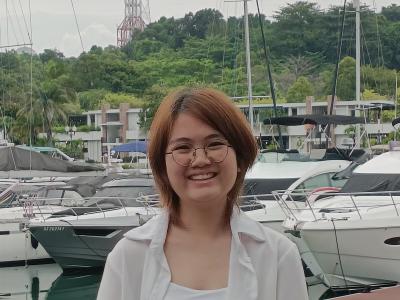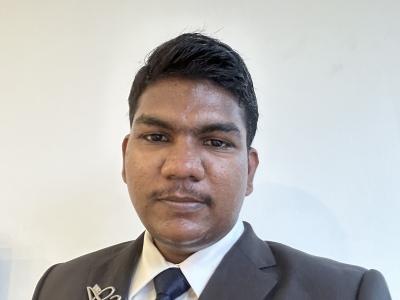
Matthew Luo is an Information Systems (second major in Information Security & Assurance) graduate from Singapore Management University (SMU). Aside from his full-time job as a Technology Analyst at JPMorgan Chase & Co, Matthew also runs a startup called LUPPI—an acronym for Linking Up People & Professionals Instantly. It is a Service-Hailing mobile app and has been available on both Apple Store and Google Play Store since December 2016.
“Working and studying is never an easy task but if you enjoy what you are doing, it becomes fun,” explains Matthew who started LUPPI with two other partners, Mark Wong and Nicholas Wong, while doing his undergraduate degree at SMU.
Team LUPPI. Mark (Front), Matthew (Middle), Nicholas (Back), during an interview with Straits Times. (Source: The Straits Times, “‘Matchmakers’ hook up users with service providers”)
Having interned both at KPMG and JPMorgan in the summers of 2015 and 2016 respectively, Matthew says, “Working and having ownership of your own company is very different from interning because you have to take full ownership of your decisions.”
As the LUPPI’s Chief Technology Officer, Matthew designed the entire application and manages the servers and databases of the app. Matthew explains that Team LUPPI is a collective blend of pragmatism and youthful imagination. It is this unique blend that brings together a concoction of ideologies to ensure LUPPI’s relevance for the general community—be it the Gen X, Y or Z.
Tell us what LUPPI is all about. What is the objective and how does it work?
LUPPI is a service-hailing mobile app and it is the first-of-its-kind. It is built on a very different “reverse enquiry” structure. Similar to ride-hailing apps such as Grab and Uber, LUPPI’s user can “hail” for services and be attended to instantaneously by the relevant participating professionals.
On the other hand, typical service-provider platforms—such as Thumbtack (US), Servishero (MY), Kaodim (MY), PageAdvsior (SG), and Findapro (SG)—are conceptualised based on a digitised tendering and/or listing model, where users have to spend time searching for what they want. These methodologies are conventional and their effectiveness has been shown to be diminishing with time and technology.

Screenshots from LUPPI
When did you set up LUPPI and what led you to start it?
Back in April 2016, during my Final Year Project, my project team and I had built two mobile apps for a startup. My partners, Mark and Nicholas, got to know about it through Facebook and approached me in June that year with their idea. From there, LUPPI was born.
It is only because I trusted my partners, and their rich experience in the business world, that I dived right into this. I wanted to do something that I am passionate about, something that would etch a mark early in my career and strengthen my constitution to face bigger challenges in the future. Nothing could be more exciting and engaging than to be actively participating in the origination, design and architecture of a business idea.
You studied information systems in SMU—how has that contributed to your startup?
I would never have imagined I would be graduating with a degree in Information Systems when I received my A level’s result in 2010. My first choice had always been to enrol in the Lee Kong Chian School of Business, but my grades did not meet the minimum requirements. Since I always had an interest in technology, I decided to apply for the School of Information Systems (SIS).
However, just when I thought I would stand a high chance getting enrolled in SIS, I got rejected twice by them in the years 2011 and 2012. It was only on my third try in 2013 that I passed their interview and was successfully accepted into SIS.
Studying information systems in SMU has given me a lot of opportunities to gain both hard and soft skills. Coding was something I always found very hard to master, but SIS’s curriculum is designed to allow students, like myself, to explore other possibilities they are good at. I found myself excelling in other components such as project management and software security. It was through my final year project (FYP) that I learnt a very important lesson—as the project manager of the team then, I learnt the importance of balancing both the client’s and team’s expectations. All in all, the skills that I have picked up over the years at SMU have been very relevant to what I do at LUPPI.
Share with us what are some challenges you have faced and had to overcome in creating this app.
When I first started working with LUPPI, one of the challenges that I had to face was the reality that LUPPI was my life now. Essentially, it meant that the only barrier preventing LUPPI from growing even bigger, was me. It’s here I got acquainted with the virtues of ‘accountability’ and ‘responsibility’. It was difficult, at first, to bridge the gap between academic literature and the real world. It was no longer just about getting a good grade but how I could apply the teachings from SMU’s curriculums to adapt and address the ever-shifting commercial challenges.
Slowly, I started to learn more about the business aspects of LUPPI through constant communication with my partners. Being open to new ideas and knowledge is key if you want to constantly outdo yourself and overcome challenges.
How do you see this app benefitting businesses/ service providers? What about users of the app?
Technology has disrupted many traditional business models today with new mobile applications such as Uber, GrabTaxi, Carousell, etc. The global consumer demographics have been shaped by leading tech juggernauts. However, there was still a jarring gap between consumers and service providers that nobody has attempted to close, and LUPPI was conceived and designed to narrow that disconnect.
The evolving behavioural climate has redefined consumption patterns. “Trust” of a product is derived from ratings and reviews, an implicit endorsement from the social community. From Amazon, Google to Airbnb, consumers today make purchasing decisions based on a grading system. A higher rating implies that the product has a higher level of creditability, giving a proof of authenticity. We see that in the products marketplace; but what about services? What about the professionals and service providers?
This is where LUPPI comes in, with an aim to bridge this disparity. For the client, LUPPI empowers them to “hail” for services, and be attended to instantly by relevant professionals of the service/product that they seek.
It aims to create a unique experience where the consumer feels like a private client who is given dedicated attention. If you want something, people will come and render their services to you at the snap of your fingers.
For the professional, the platform provides a ratings/review avenue that will allow them to establish a credibility measure—a testimony for which to conduct their profession.
It’s a win-win situation for both clients and professionals. Through community reviews/ratings, users can select a credible service provider, and their needs attended to enthusiastically. While the professionals, through their ability and gumption, can build a more solid resume to advance their career.
What hopes do you have for LUPPI? Where do you see it going in 2–3 years?
I want to make LUPPI the go-to app when people think of service providers. My team and I have a common vision to export its application globally. We want to use LUPPI to address the needs of both consumers and service providers. The next few years is going to be extremely exciting for Team LUPPI as we work towards our vision to expand LUPPI globally.
You were still a student at SMU when you and your partners started LUPPI. How did you cope with juggling a start-up and studies?
As a student at SMU, I had the chance to explore a lot of leadership roles and responsibilities while I was studying. In my second year, I was the president of the SIS pageant committee, as well as a student leader of an overseas community service project (OCSP) to Vietnam. These experiences allowed me to learn how to manage my time more efficiently while juggling my studies. As ironic as it may sound, the more activities that I took part in, the more efficient I became at my studies. With such a tight schedule, I was very effective in organising different blocks of time to complete each of the tasks that I planned to do.
Project Chong Chong IV. Matthew led a team of 13 people, with his co-leader Jeremy, to Vietnam and sponsored 10 students’ education till they reach university.
Glow 2014 SIS Pageant Committee. Matthew was the president of the committee.
Participating in the development of LUPPI gives me ownership over my company. In university, if you fail to finish revising your work, there is always another day to catch up on our lectures. However, there are no second chances or “another day” when you fail to seize an opportunity with potential investors/clients. The moment you choose to do it another day, the opportunity is gone. “You snooze, you lose.” This motivated me to complete my school assignments as soon as I could so that I had extra time to work on LUPPI.
What advise do you have for fellow student entrepreneurs or students thinking of starting their business while still studying?
Do what you like to do. Don’t ever let people tell you that your idea does not work. You must start believing in yourself first before you can sell your idea to the world. While you are still young, push yourself so that you will not look back and regret the choices you have made. Don’t forget to enjoy yourself by engaging in your favourite hobbies to recharge and get ready to fight another day. I play in a band called The Insiders and that is my way to escape reality and express my creativity through music.

The Insiders at Nite 2016 where Matthew is the lead guitarist of this band
Finally, learn to appreciate your family and all the small things. I have an extremely supportive family and I know that if I fail one day, they will have my back. My mum would wake up earlier every day to get the water heater going, so that my sisters and I could sleep just a little longer. It is always very nice to start the day with a warm shower and for that, I am grateful for my family. When you learn how to be appreciative of your family, you learn how to be appreciative of everything else around you and you learn how to look at the good things in life when other things go bad.

Family trip to Taiwan in December 2016


